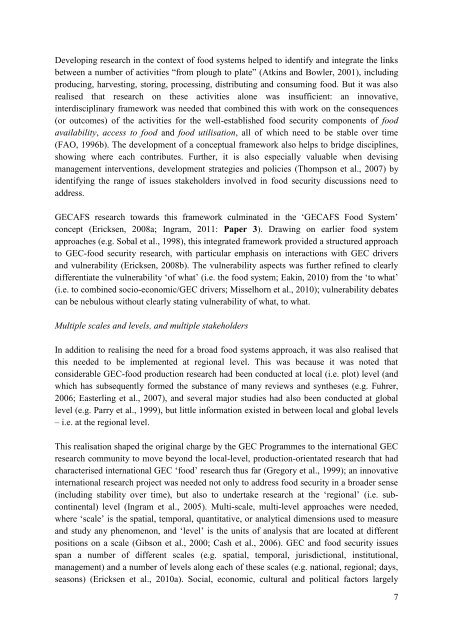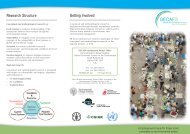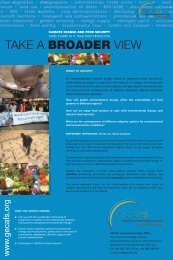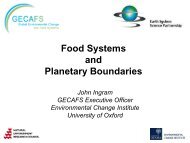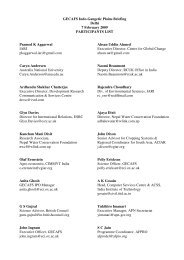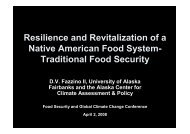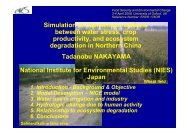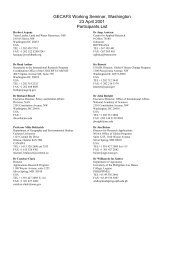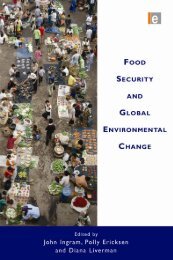While the flow of the argument about how GEC will affect food security via impacts on cropgrowth is thus relatively easy <strong>to</strong> define, the flow back <strong>to</strong> how this will affect regionalproduction, thence availability, and thence provision is far from simple. This is because manyother fac<strong>to</strong>rs emerge which govern these parameters. For instance, even the extrapolation ofpoint results <strong>to</strong> estimate regional production is not straightforward due <strong>to</strong> a range ofgenotypes and management practises employed and landscape heterogeneity (Ingram et al.,2008: Paper 2). Significant advances are however now being made in modelling regionalproduction (e.g. Challinor et al., 2007; Thorn<strong>to</strong>n et al., 2011). Even if changes in regionalproduction are established, assessing how this will affect food security within the region andbeyond is highly complex due <strong>to</strong> wide range of socioeconomic fac<strong>to</strong>rs such as demography,wealth, prices, cus<strong>to</strong>ms and intra- and inter-regional trade arrangements that all affect access<strong>to</strong> food.The <strong>Global</strong> <strong>Environmental</strong> Change and <strong>Food</strong> Systems Project (GECAFS)The interdisciplinary notion of food security was further developed within an internationallyagreedresearch project (<strong>Global</strong> <strong>Environmental</strong> Change and <strong>Food</strong> Systems, GECAFS, 2001-2011) under the auspices of the international GEC research community (Gregory et al.,1992). The goal of GECAFS was “<strong>to</strong> determine strategies <strong>to</strong> cope with the impacts of globalenvironmental change on food systems and <strong>to</strong> assess the environmental and socioeconomicconsequences of adaptive responses aimed at improving food security” (Ingram et al., 2005).GECAFS planning identified four issues of particular interest because they would set thecontext for many researchable questions (Ingram et al., 2005). First was the need <strong>to</strong> betterunderstand what constitutes vulnerability <strong>to</strong> GEC in relation <strong>to</strong> food security. This would bekey <strong>to</strong> helping <strong>to</strong> determine where, when and which sections of society are most at risk, andwas especially necessary given problems of predicting global food production (Döös, 2002).Second was the need <strong>to</strong> construct scenarios of future conditions that encapsulate thesocioeconomic and biogeophysical fac<strong>to</strong>rs that determine food security. Third was the need<strong>to</strong> assess options for reducing the vulnerability of food systems <strong>to</strong> GEC. Fourth was the need<strong>to</strong> understand how best <strong>to</strong> report and communicate research results and so help deviseimproved policies <strong>to</strong> adapt food systems <strong>to</strong> GEC.Developing ‘food systems’ researchAkin <strong>to</strong> the need for adopting the broader concept of food security (rather than just foodproduction), it was also recognised that research planning and policy formulation <strong>to</strong> addressthis challenging goal needed <strong>to</strong> be set within the context of food systems, rather than justfood supply. The term “food systems” was chosen for the GECAFS focus (and hence is usedin the project title) rather than “food security” as it was recognised that it is food systems thatunderpin food security and that defining the system clearly would provide a structured,analytical lens <strong>to</strong> research the highly complex food security agenda.6
Developing research in the context of food systems helped <strong>to</strong> identify and integrate the linksbetween a number of activities “from plough <strong>to</strong> plate” (Atkins and Bowler, 2001), includingproducing, harvesting, s<strong>to</strong>ring, processing, distributing and consuming food. But it was alsorealised that research on these activities alone was insufficient: an innovative,interdisciplinary framework was needed that combined this with work on the consequences(or outcomes) of the activities for the well-established food security components of foodavailability, access <strong>to</strong> food and food utilisation, all of which need <strong>to</strong> be stable over time(FAO, 1996b). The development of a conceptual framework also helps <strong>to</strong> bridge disciplines,showing where each contributes. Further, it is also especially valuable when devisingmanagement interventions, development strategies and policies (Thompson et al., 2007) byidentifying the range of issues stakeholders involved in food security discussions need <strong>to</strong>address.GECAFS research <strong>to</strong>wards this framework culminated in the ‘GECAFS <strong>Food</strong> System’concept (Ericksen, 2008a; Ingram, 2011: Paper 3). Drawing on earlier food systemapproaches (e.g. Sobal et al., 1998), this integrated framework provided a structured approach<strong>to</strong> GEC-food security research, with particular emphasis on interactions with GEC driversand vulnerability (Ericksen, 2008b). The vulnerability aspects was further refined <strong>to</strong> clearlydifferentiate the vulnerability ‘of what’ (i.e. the food system; Eakin, 2010) from the ‘<strong>to</strong> what’(i.e. <strong>to</strong> combined socio-economic/GEC drivers; Misselhorn et al., 2010); vulnerability debatescan be nebulous without clearly stating vulnerability of what, <strong>to</strong> what.Multiple scales and levels, and multiple stakeholdersIn addition <strong>to</strong> realising the need for a broad food systems approach, it was also realised thatthis needed <strong>to</strong> be implemented at regional level. This was because it was noted thatconsiderable GEC-food production research had been conducted at local (i.e. plot) level (andwhich has subsequently formed the substance of many reviews and syntheses (e.g. Fuhrer,2006; Easterling et al., 2007), and several major studies had also been conducted at globallevel (e.g. Parry et al., 1999), but little information existed in between local and global levels– i.e. at the regional level.This realisation shaped the original charge by the GEC Programmes <strong>to</strong> the international GECresearch community <strong>to</strong> move beyond the local-level, production-orientated research that hadcharacterised international GEC ‘food’ research thus far (Gregory et al., 1999); an innovativeinternational research project was needed not only <strong>to</strong> address food security in a broader sense(including stability over time), but also <strong>to</strong> undertake research at the ‘regional’ (i.e. subcontinental)level (Ingram et al., 2005). Multi-scale, multi-level approaches were needed,where ‘scale’ is the spatial, temporal, quantitative, or analytical dimensions used <strong>to</strong> measureand study any phenomenon, and ‘level’ is the units of analysis that are located at differentpositions on a scale (Gibson et al., 2000; Cash et al., 2006). GEC and food security issuesspan a number of different scales (e.g. spatial, temporal, jurisdictional, institutional,management) and a number of levels along each of these scales (e.g. national, regional; days,seasons) (Ericksen et al., 2010a). Social, economic, cultural and political fac<strong>to</strong>rs largely7
- Page 1 and 2: From Food Production to Food Securi
- Page 3 and 4: From Food Production to Food Securi
- Page 5 and 6: Table of ContentsAbstract .........
- Page 7 and 8: Paper 6: Undertaking Research at th
- Page 9: AbstractFood security is a conditio
- Page 12 and 13: 2010 about 925 million people had t
- Page 14 and 15: water) are used, and reduce negativ
- Page 18 and 19: determine interactions along and be
- Page 20 and 21: Paper 3: A Food Systems Approach to
- Page 23: From Food Production to Food Securi
- Page 26 and 27: concerns and are now issues that mu
- Page 28 and 29: the relationships between GEC and f
- Page 30 and 31: Theme 2 aims to understand how comm
- Page 32 and 33: GEC and the Food System of the Indo
- Page 34 and 35: Paper 2: The role of agronomic rese
- Page 36 and 37: These advances have resulted from a
- Page 38 and 39: Crop selection to determine mechani
- Page 40 and 41: Agronomic science is central to imp
- Page 42 and 43: Agronomic research in relation to f
- Page 44 and 45: The discussion above identifies a n
- Page 46 and 47: interventions and political inertia
- Page 48 and 49: While research on producing food ha
- Page 50 and 51: Box 1 Food system Activities and fo
- Page 52 and 53: In addition to broadening the debat
- Page 54 and 55: options. Examples already seen rang
- Page 56 and 57: Figure 3 Outcomes for 10 variables
- Page 58 and 59: Figure 4 Nine ‘planetary boundari
- Page 60 and 61: Figure 5 Environmental change, food
- Page 62 and 63: Table 1: Indicative analysis of the
- Page 65: From Food Production to Food Securi
- Page 68 and 69:
Trade Agreement (NAFTA) and the Eur
- Page 70 and 71:
Parry et al., 2005). Conducting foo
- Page 72 and 73:
is provided in the ESF/COST Forward
- Page 74 and 75:
Paper 5: Engaging Stakeholders at t
- Page 76 and 77:
into actions (strategies, policies,
- Page 78 and 79:
Box 2 Engaging with stakeholders in
- Page 80 and 81:
Box 3 Setting the research agenda f
- Page 82 and 83:
Third, and of considerable practica
- Page 84 and 85:
Figure 2: Organizing and understand
- Page 86 and 87:
organizations made up of numerous n
- Page 88 and 89:
Elements of good practice in stakeh
- Page 90 and 91:
Finally, it is worth noting that fo
- Page 92 and 93:
development (Lee, 1999; Gunderson a
- Page 94 and 95:
Box 7 The GECAFS stakeholder survey
- Page 96 and 97:
‘break down’ what might be a hi
- Page 98 and 99:
Paper 6: Undertaking Research at th
- Page 100 and 101:
agriculture in many parts of the wo
- Page 102 and 103:
gaps. The presence of a strong tech
- Page 104 and 105:
an average of two years to coalesce
- Page 106 and 107:
Institute for Meteorology and Hydro
- Page 108 and 109:
Identifying case study sitesResearc
- Page 110 and 111:
can both benefit from and contribut
- Page 112 and 113:
Box 5 Mapping stakeholder interests
- Page 114 and 115:
Holding planning meetings in locati
- Page 116 and 117:
This reorientation of the debate fr
- Page 118 and 119:
Importance of this type of research
- Page 120 and 121:
Integrating the food system concept
- Page 122 and 123:
awareness of the GEC issues within
- Page 124 and 125:
pollutants were then introduced as
- Page 126 and 127:
communities operating in food syste
- Page 128 and 129:
Improving input-use efficiency acro
- Page 130 and 131:
governance focuses on the range of
- Page 132 and 133:
Developing research agendas in supp
- Page 134 and 135:
The renewed approach to interdiscip
- Page 136 and 137:
BIELAK, A., HOLMES, J., SAVGÅRD, J
- Page 138 and 139:
EAKIN, H. 2010. What is Vulnerable?
- Page 140 and 141:
GODFRAY, H. C. J., BEDDINGTON, J. R
- Page 142 and 143:
INGRAM, J. S. I. & FERNANDES, E. C.
- Page 144 and 145:
LYUTSE, S. 2010. The One Billion To
- Page 146 and 147:
RAYNER, S. & MALONE, E. L. 1998. Hu
- Page 148 and 149:
UNDP 2006. The 2006 Human Developme
- Page 150 and 151:
activities “from plough to plate
- Page 152 and 153:
contribution to the science agenda:
- Page 154 and 155:
urgently needed, and - given the gr
- Page 156 and 157:
GECAFS plannenmakerij stelde vast d
- Page 158 and 159:
ieder hun eigen groep van betrokken
- Page 160 and 161:
het gebied van beheer hebben betrek
- Page 162:
Curriculum VitaeFollowing a BSc in


